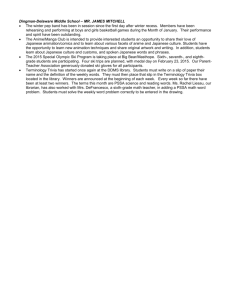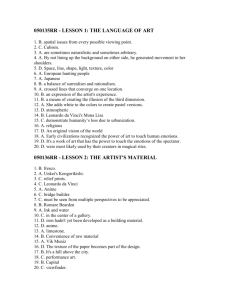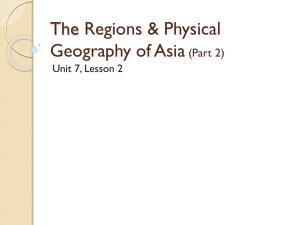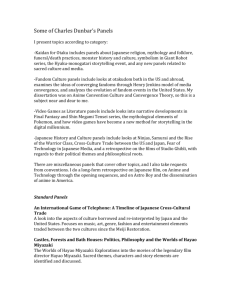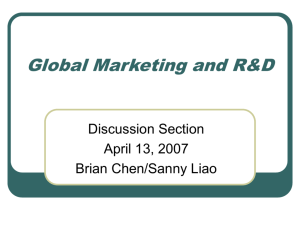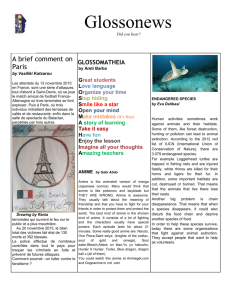PowerPoint Presentation - Cultural globalization
advertisement
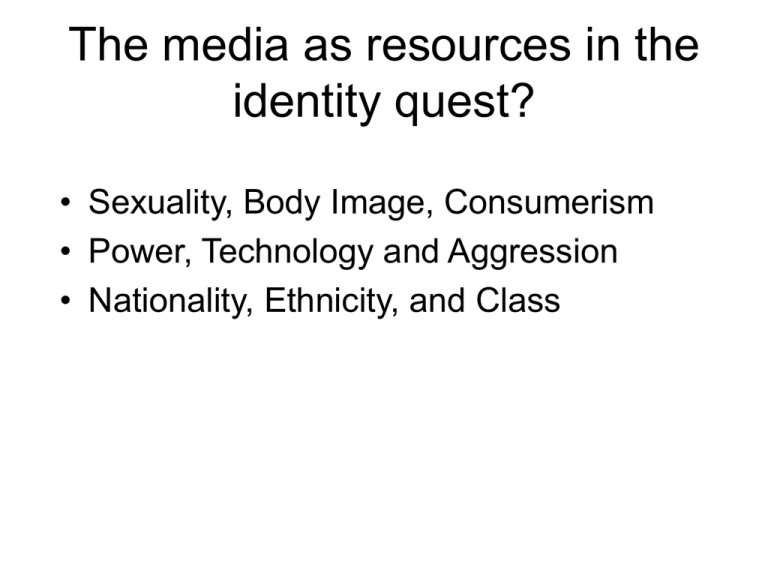
The media as resources in the identity quest? • Sexuality, Body Image, Consumerism • Power, Technology and Aggression • Nationality, Ethnicity, and Class Globalization, Immigration, and Social Diversity • The national cultural curriculum: cultural knowledge as the glue of society = the cannon and the melting pot/ mosaic/ salad bowl • The Canadian Broadcast System Mandate: reflecting our lives, informing our citizens, consolidating our values and telling our stories to each other Disneyfication: Colonization of the Imagination or Market Liberation? • Mouse ears vs coon-skin caps? A universal child articulated around traditional children’s culture values (folklore, wholesome play, music) or a national mythology based on American values? • Barbie and Americanization: The erosion of cultural boundaries by mass media and commercialization (the triumph of american programming genres) • G.I. Joe and action toys: resisting militarized masculinity • McDonaldization and Cultural Convergence : Market Power: hamburgers Ritzer, G.and rationalization of the global mass production and distribution system • 30,000 outlets in 121 of 193 countries • 43% of the global fast food market • $ 41 billion annually spent at McDonalds Resisting Cultural Colonization • • • • Can con: the music industry The book Industry Subsidized national production NFB The Sweater: – Hybridity and multiculturalism – Play culture and the bond within diversity – But the fate of hockey? Product on the ice! Sesame-ization (Hendershot) • Glo-local culture: 50% own production • Cinar scams • Canadian Ambivalence: Joe’s rant and Molson Canadian (we are what you aren’t) • Are Carebears Canadian? Canada as the globalization laboratory? • Toy industry: name a canadian toy or game? – Reclaiming community: Parade of the Lost Souls • Two questions about globalization of children’s marketing – Homogenization vs. mobility: • Lemish study – Hybridity vs. multiculturalism • Mulan and Bollytoons Gendered Fantasy: Lemish 2002 Globalized Children’s Culture: implications of anime confronting the West & Asia Kaori Yoshida at Simon Fraser University, March 31, 2005 Spirited Away (2001) Animation: fantasy & a site for global politics • Association with “innocence” of childhood & neutrality (“odorless” product) • A site where political battles take place • Fantasy world: experience differences & “otherness” during establishing sense of “self” or “subjectivity” Aspects of the study • How the imaginary of animation contributes to or undermines the formation of national identity, through recognition of “self” in relation to the “other” • The manner in which transnationally traveling anime paradoxically operates with national culture to challenge the Western aesthetics Background of anime as globalized culture (1) Disney discourse: Wonderful world of Disney Suppression of “others” Solidify the self-other binary opposition - The Three Caballeros, Aladdin, Pocahontas Limitation of Disney power - Failure & Criticism Interaction of anime with “others” What are signifiers and signified…? Interaction of anime with “others” • Anime as a hybrid text: – Bhabha’s “hybridity” • “the third space” • Reinforcement of colonizer’s power vs “threat” – Anime’s hybridity as “the third space”: • celebration of the previously marginalized • destabilization of power hierarchy (1) Interaction with the US hegemony “If you are the parent of an American child, then you may well have noticed how Japanese our kid culture has become. No set of image has dominated childish desires quite so handily over the last five years or so as the amalgams of cuteness and power in the Japanese-made cartoons…” (New York Times, December 15, 2002) “…. It’s (anime) outside the mainstream….exotic, deferent, not American…. [Compared to Disney,] it’s a highly developed art form and we need to get away from our candy coated Disney films…. Anime can be watched at any age. Most anime have plots and try to be different.” (Napier 2000: 249) De-Japanizing of characters “Japanese animators look on the other side of mirror, America” (Oshii 1996: 78) “Before the Japanese came into contact with Westerners, they depicted themselves with Asian features and often smaller than life eyes. After the war however, standards of beauty that many Japanese aspired to has been those of the West. Girl comics of the post-war began to depict characters with the round eyes, long leggy look of fashion models of Paris and New York.” (Lu 1999 “Anime vs cartoons- A look at cultural identity”) “The general consensus also among fans an animators alike also is that if all Japanese characters are drawn looking Asian, the show becomes very boring visually.” (Lu 1999 “Anime vs cartoons”) “I also know that it is the expressed desire of the non-blonde Other for those characteristics that are seen as the quintessential markers of racial aesthetic superiority that perpetuate and uphold white supremacy.” (bell hooks 1995: 29) (2) Interaction with “other” Asia: implication of representation of “similar other” – Geographical proximity, cultural affinity? – Historical conflicts within Asia – “Asianism”: strategic auto-Orientalism? • Experience of shared “Asian modernity” • Leo Ching’s study of Asian pop culture (Oshin, Doraemon) • Lag between Japan and the “other” Asia Doraemon Miyazaki’s anime: hybridity & Japaneseness (1) Hybridized characters & “Japanese-ness” – Nausicaä of the Valley of the Wind (1984) – Kiki’s Delivery Service (1989) Celebration of “others” (Spirited Away 2001) (2) Re-discovery of Japanese-ness or self-alienation? – Re-introducing Japanese tradition (Japanese-ness) – De-familiarlization of “Japanese Thing” • Princess Mononoke (1997) – Setting: 13-14C Japan – Characters: Samurai Warriors Japanese-looking protagonists – Traditional houses, scenery Spirited Away Spirited Away (3) “Other” Asia in Miyazaki’s hybridized anime: representation of Japanese superiority? – Importance of the “past” & Japan’s association with Asia – Visual: absence of Western-ness; “other” Asia in Japan’s “past” Vivid color plates, screens: Are these Japanese or “other” Asian? Dragon in Spirited Away Conclusion (1) The phenomena of anime: the empowerment of local cultures which leads to resist the global (or the West, the US) (2) Intensification of cultural hybridity in anime text (3) Miyazaki’s anime: – problematizes the notion of Western aesthetic homogenization – exposes (implicit) power relations between Japan and “other” Asia
